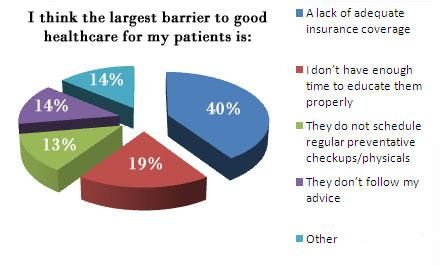2010 Great American Physician Survey: Barriers to Good Healthcare
We often hear physicians' frustrations about their patients not following their advice. How many times have you discussed a treatment plan or a healthy lifestyle with a patient, only to have her return having not followed a single item?
Note: This is the fourth in a series of blog entries about the results of our 2010 Physicians Practice Great American Physician Survey. Full results of the survey and other related blog entries are now available here.
We often hear physicians' frustrations about their patients not following their advice. How many times have you discussed a treatment plan or a healthy lifestyle with a patient, only to have her return having not followed a single item? And she's irritated about not getting better?
In fact, 14 percent of respondents to our 2010 Great American Physician Survey cited "they don't follow my advice" as the largest barrier to good healthcare for your patients. Not the most selected answer, but an interesting one at that. Similarly, 13 percent counted "they do not schedule regular preventative checkups/physicals" as the top reason. The most popular answers were a lack of adequate insurance coverage and a lack of time to properly educate.
Here's the full breakdown.

This year's responses closely mirror those from last year's survey. In 2009, a few more respondents cited a lack of insurance coverage as the largest barrier.
We gave respondents an opportunity to fill in their own responses for "other," and I find those particularly revealing. Several cited a lack of time, the government, and third-party payers as barriers to good healthcare.
But a vast majority referenced their patient's dearth of responsibility and concern for their care, the unwillingness to make it a priority, poor lifestyle choices, and noncompliance, which follow the theme of needing more patient engagement in their care.
One wrote, "Our culture doesn't stress the importance of the patient's role in their own health." Another said, "They just don't care. They expect everyone to do it all for them. Don't make me cut back my salt, give me a pill."
There's a host of reasons for noncompliance, from the patient not understanding the treatment to financial constraints to a simple unwillingness to change. So what's the solution? How can you encourage more patient involvement?
Here are a few thoughts, courtesy a 2008 Physicians Practice article on patient noncompliance:
• Ask if the patient understands the directions and if he has any other questions.
• Try having the patient repeat back your instructions, and maybe even demonstrate how to administer the meds, for example.
• Assign your patients homework, where they keep logs of what's ailing them, what they're eating, or their treatments.
Another tactic is to put it in writing, including the diagnosis, recommended treatment plan, options, etc. This can be made easier by using an automated informed consent program, which can include patient education materials. It's a system used by urologist Neil Baum, who is a guru in physician productivity and efficiency. He also told me recently that his practice has 30 five-minute videos on common topics and procedures his office performs. Patients watch these videos before seeing the physician, which saves time and offers some patient education.
Do you have any techniques for boosting patient engagement and compliance?